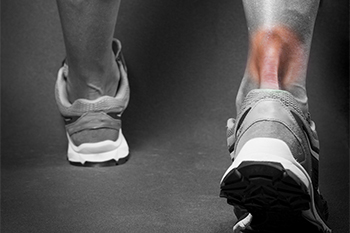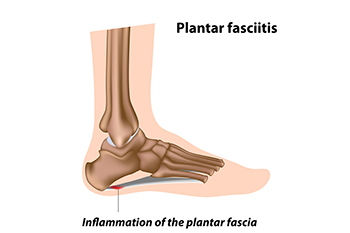Items filtered by date: July 2023
Heel Pain and Achilles Tendon Injuries

The Achilles tendon connects the calf muscles to the heels, and despite it being strong, it is not especially flexible. This tendon has a small amount of room to move and an injury can cause it to stretch beyond its normal limits. The noticeable symptoms when the Achilles tendon stretches too far are inflammation, irritation, heel pain, and it is often difficult to walk. People who run and increase speed and distance too quickly may be prone to incurring an Achilles tendon injury, and it is beneficial to perform specific stretches to loosen up this tendon before starting a run. This type of injury may also happen from training in cold weather, having poor running form, or having flat feet. A patient may often seek advice from a podiatrist to find relief from the severe pain this type of injury can cause. An X-ray can be performed that can rule out a fractured bone. If you have heel pain, it is suggested that you visit a podiatrist who can successfully treat an Achilles tendon injury.
Achilles tendon injuries need immediate attention to avoid future complications. If you have any concerns, contact Harris Greenberger, DPM of Fairfield County Foot Surgeons. Our podiatrist can provide the care you need to keep you pain-free and on your feet.
What Is the Achilles Tendon?
The Achilles tendon is a tendon that connects the lower leg muscles and calf to the heel of the foot. It is the strongest tendon in the human body and is essential for making movement possible. Because this tendon is such an integral part of the body, any injuries to it can create immense difficulties and should immediately be presented to a doctor.
What Are the Symptoms of an Achilles Tendon Injury?
There are various types of injuries that can affect the Achilles tendon. The two most common injuries are Achilles tendinitis and ruptures of the tendon.
Achilles Tendinitis Symptoms
- Inflammation
- Dull to severe pain
- Increased blood flow to the tendon
- Thickening of the tendon
Rupture Symptoms
- Extreme pain and swelling in the foot
- Total immobility
Treatment and Prevention
Achilles tendon injuries are diagnosed by a thorough physical evaluation, which can include an MRI. Treatment involves rest, physical therapy, and in some cases, surgery. However, various preventative measures can be taken to avoid these injuries, such as:
- Thorough stretching of the tendon before and after exercise
- Strengthening exercises like calf raises, squats, leg curls, leg extensions, leg raises, lunges, and leg presses
If you have any questions please feel free to contact our office located in Norwalk, CT . We offer the newest diagnostic tools and technology to treat your foot and ankle needs.
Plantar Fasciitis and Toe Extensions
 Plantar fasciitis is one of the leading foot conditions among Americans causing heel pain. The condition is characterized by the aggravation of the plantar fascia. Depending on your particular case of plantar fasciitis, a medical professional might recommend that you perform any number of stretches to mitigate the pain. For example, a medical professional, such as a podiatrist, might recommend that to combat plantar fasciitis, you can perform toe extensions. This stretch can be performed by putting the affected foot behind the other in a standing position. Then, contract the calf muscles and lift the back heel to essentially extend the toes. If you are someone that is living with plantar fasciitis, it is suggested that you contact a podiatrist today for an exam and treatment options.
Plantar fasciitis is one of the leading foot conditions among Americans causing heel pain. The condition is characterized by the aggravation of the plantar fascia. Depending on your particular case of plantar fasciitis, a medical professional might recommend that you perform any number of stretches to mitigate the pain. For example, a medical professional, such as a podiatrist, might recommend that to combat plantar fasciitis, you can perform toe extensions. This stretch can be performed by putting the affected foot behind the other in a standing position. Then, contract the calf muscles and lift the back heel to essentially extend the toes. If you are someone that is living with plantar fasciitis, it is suggested that you contact a podiatrist today for an exam and treatment options.
Plantar fasciitis can be very painful and inconvenient. If you are experiencing heel pain or symptoms of plantar fasciitis, contact Harris Greenberger, DPM from Fairfield County Foot Surgeons. Our podiatrist can provide the care you need to keep you pain-free and on your feet.
What Is Plantar Fasciitis?
Plantar fasciitis is the inflammation of the thick band of tissue that runs along the bottom of your foot, known as the plantar fascia, and causes mild to severe heel pain.
What Causes Plantar Fasciitis?
- Excessive running
- Non-supportive shoes
- Overpronation
- Repeated stretching and tearing of the plantar fascia
How Can It Be Treated?
- Conservative measures – anti-inflammatories, ice packs, stretching exercises, physical therapy, orthotic devices
- Shockwave therapy – sound waves are sent to the affected area to facilitate healing and are usually used for chronic cases of plantar fasciitis
- Surgery – usually only used as a last resort when all else fails. The plantar fascia can be surgically detached from the heel
While very treatable, plantar fasciitis is definitely not something that should be ignored. Especially in severe cases, speaking to your doctor right away is highly recommended to avoid complications and severe heel pain. Your podiatrist can work with you to provide the appropriate treatment options tailored to your condition.
If you have any questions please feel free to contact our office located in Norwalk, CT . We offer the newest diagnostic and treatment technologies for all your foot and ankle needs.
